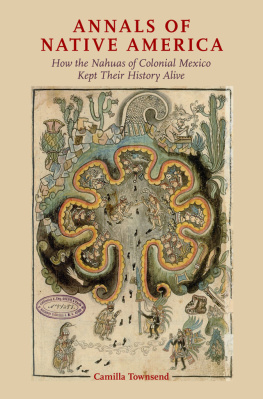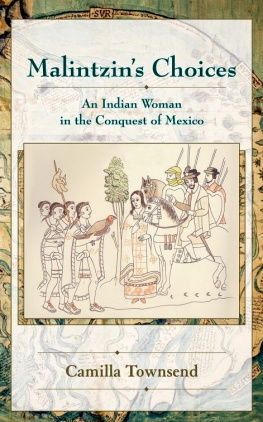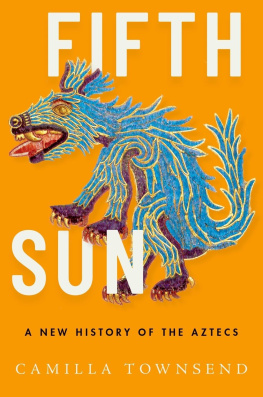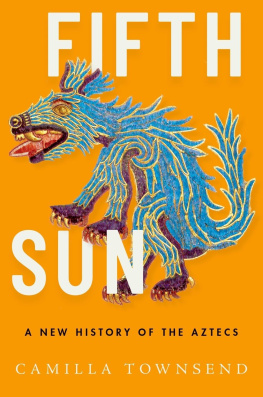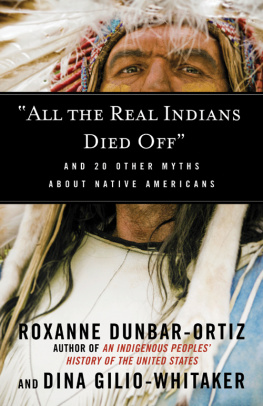Annals of Native America
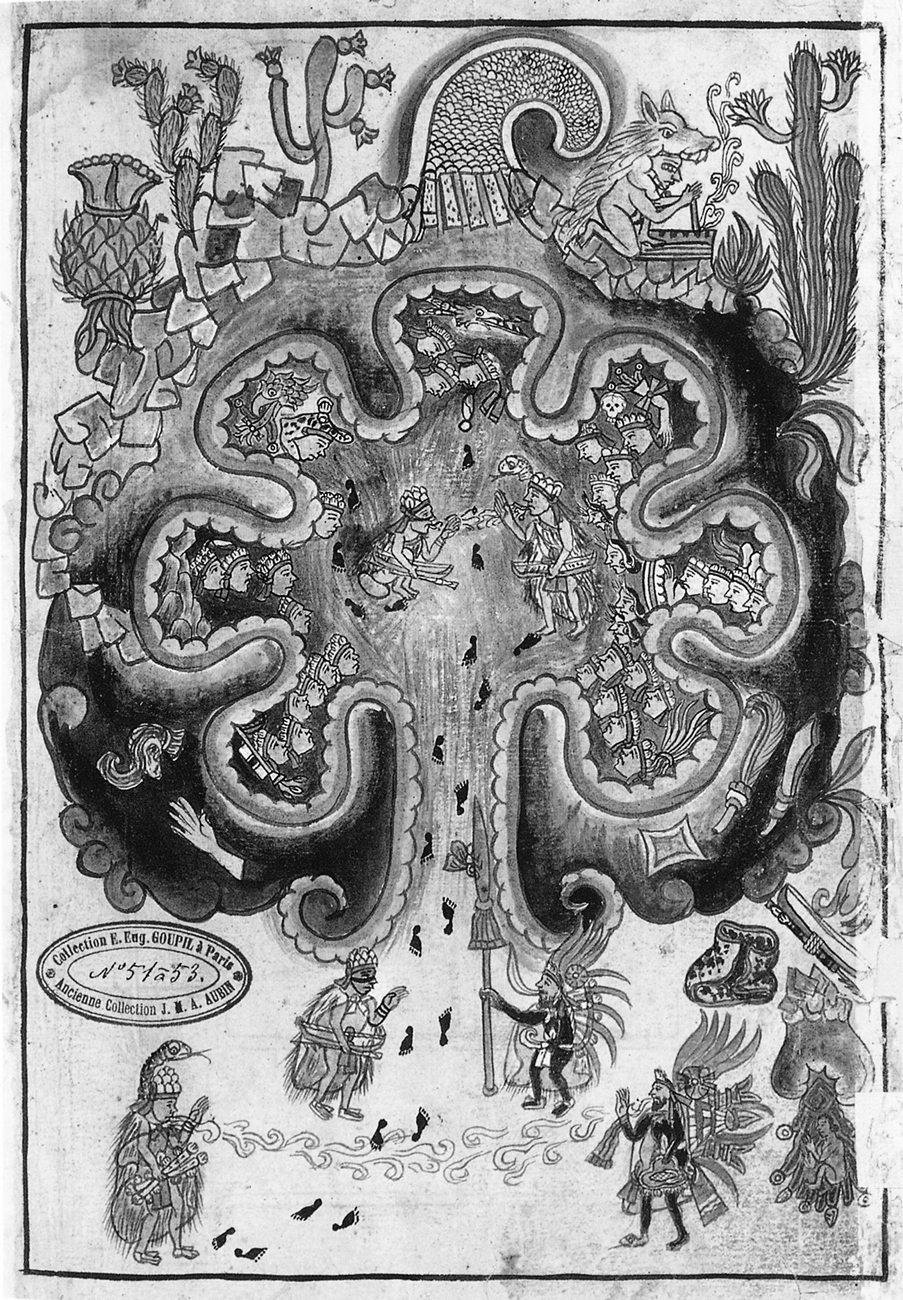
Historia Tolteca Chichimeca, folio 16. The people depart from Chicomoztoc (Seven Caves).
Courtesy Bibliothque Nationale de France.

Oxford University Press is a department of the University of Oxford. It furthers the Universitys objective of excellence in research, scholarship, and education by publishing worldwide. Oxford is a registered trade mark of Oxford University Press in the UK and certain other countries.
Published in the United States of America by Oxford University Press
198 Madison Avenue, New York, NY 10016, United States of America.
Oxford University Press 2017
All rights reserved. No part of this publication may be reproduced, stored in a retrieval system, or transmitted, in any form or by any means, without the prior permission in writing of Oxford University Press, or as expressly permitted by law, by license, or under terms agreed with the appropriate reproduction rights organization. Inquiries concerning reproduction outside the scope of the above should be sent to the Rights Department, Oxford University Press, at the address above.
You must not circulate this work in any other form and you must impose this same condition on any acquirer.
Library of Congress Cataloging-in-Publication Data
Names: Townsend, Camilla, author.
Title: Annals of Native America : how the Nahuas of colonialMexico kept their history alive / Camilla Townsend.
Description: New York, NY : Oxford University Press, 2016. | Includes bibliographical references and index.
Identifiers: LCCN 2016017658 (print) | LCCN 2016027807 (ebook) | ISBN 9780190628994 (hardcover : alk. paper) | ISBN 9780190629007 (Updf) | ISBN 9780190629014 (Epub)
Subjects: LCSH: NahuasHistorySources. | NahuasHistoryAuthorship. | Nahuatl languageHistory. | Nahuatl literatureHistory. | Indians of MexicoHistory. | MexicoAntiquities. | MexicoHistoryTo 1519. | MexicoHistoryConquest, 15191540.
Classification: LCC F1221.N3 T69 2016 (print) | LCC F1221.N3 (ebook) | DDC 972/.00497452dc23LC record available at https://lccn.loc.gov/2016017658
Dedicated to the memory
of James Lockhart
and Luis Reyes Garca
There is no permanence. Do we build a house to stand forever, do we seal a contract to hold for all time? Do brothers divide an inheritance to keep forever, does the flood-time of rivers endure? It is only the nymph of the dragon-fly who sheds her larva and sees the sun in his glory. From the days of old there is no permanence.
The Epic of Gilgamesh
With sad flower tears [with poets tears], I the singer set my song in order, remembering the princes who lie shattered, who lie enslaved in the place where all are shorn, they who were lords, who were kings on earth, who lie like withered feathers, like shattered jades. If only this [world] could have been before these princes eyes: if only they could have seen what is now seen and known on earth.
Cantares Mexicanos
CONTENTS
The Nahuas of colonial Mexico who wrote about their history were enmeshed in a network of like-minded fellow travelers. Likewise, I, too, am proud to be part of a scholarly community that somehow is even bigger than the sum of its parts. This book is dedicated to the memory of two giantsJames Lockhart and Luis Reyes Garcawho both recently departed this world, leaving behind friends and former students to carry on their work. I met Jim Lockhart in an advanced Nahuatl seminar that he taught at Yale in the summer of 2002, and from that moment, he helped and guided me in all my studies of Nahuatl documents, including the texts in this volume. He could not have been more generous with his time and energy, and I deeply regret that I did not finish this project while he was still here. Those who knew Jim well will remind me that he would have been unsparing in his criticism as well as warm in his praise; I would have wanted to hear it all. Luis Reyes I never met. By the time I got to Tlaxcala, he was too ill to see me, but he talked with me extensively by telephone. Since then, I have tried to read every word he ever wrote. Without the work of these two men, this book could never have been written.
I also have depended on the funders who made my own work possible. Years ago, the National Endowment for the Humanities and the American Philosophical Society paid for the time off from teaching and the travel that were prerequisites to the writing of what became sabbatical at Rutgers University rendered it possible for me to finish the writing.
Archivists and librarians in a number of valuable institutions have provided essential help along the way. I give fulsome thanks to the staffs of the Archivo Histrico del Estado de Tlaxcala (AHET), the Bibliothque Nationale de France (BNF), Mexicos Instituto Nacional de Antropologa e Historia (INAH), the John Carter Brown Library (JCBL), the Library of Congress (LC) in Washington, D.C., the New York Public Library (NYPL), Princeton Universitys Firestone Library, the Princeton Theological Seminary Library, the Thomas J. Watson Library of the Metropolitan Museum of Art, and Swedens Uppsala University Library.
Colleagues at many institutions were kind enough to invite me to talk about aspects of this work, and the insightful comments and questions I met with were helpful in moving me forward in my thinking or pointing me toward further research I needed to do. I thank the participants in such conversations at Colgate University, the College of New Jersey, Davidson College, De Pauw University, Hartwick College, Nazareth College, New York University, the Ohio State University, Princeton University, Sarah Lawrence, and the University of Utah. I was honored to receive feedback from indigenous language teachers after my address to the Symposium on the Teaching and Learning of Indigenous Languages and Literatures (STLILLA) at Notre Dame in 2011. Colleagues at scholarly conferences also helped me sharpen my thinking. was discussed at Cambridge Universitys conference on Indigenous Intellectuals (2010) and the International Conference of Americanists in Mexico City (2009).
Friends and colleagues have encouraged my passionate interest and aided the work in various ways. David Tavrez and Peter Villella went above and beyond the norm and even shared research materials with me. Conversations and exchanges with many other Mesoamericanists (and a few Andeanists) have been invaluable. I thank especially Amber years ago and told me to read it. Karen has repeatedly opened up to me a vision of what it is I really want to do. I am forever in her debt. Finally, Susan Ferber at Oxford University Press has been the most marvelous editor imaginable and Julia Turner the most terrific project manager; I literally cannot thank them enough.
Last but not least, I thank the companions of my daily life, my husband and two sons. I have learned more in my years with you than I ever could have imagined; you have taught me most of what I know about the nature of the human endeavor. I value that wisdom as much, I hope, as the people I write about once did.
These terms may be originally from Nahuatl (N) or Spanish (S). Here follows the usage as seen in Nahuatl texts of the 16th and 17th centuries.

